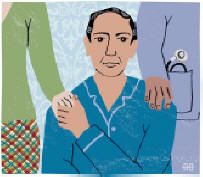Dementia
Note to Self: How I Plan to End My Life
The complicated issue of end-of-life decision making and dementia.
Posted January 29, 2015

Can one’s current, competent self make decisions on behalf of one’s future demented self—who may find modest pleasure, years later, in a life once deemed intolerable?
The quote above is from a recent article, Complexities of Choosing an End Game for Dementia, that appeared in The New York Times (1/19/15). With dementia on the rise, the issue of end-of-life decision making is becoming more complex and controversial.
I was struck by the sharp distinction being made—assumed, really—between the two “selves” and how it seemed to be framing the dialogue. I wasn’t the only one, I discovered. Dr. Susan Massad is a philosophically-informed physician and colleague of mine. She wrote a letter to the editor in response to the Times article and accepted my invitation to have it appear here as a guest column.
Challenging Some Assumptions About Dementia
by Susan Massad, M.D.
America’s population is aging. One in eight Americans suffer from some stage of dementia (Alzheimer’s being the most common), and these numbers are rising quickly.
There’s a growing conversation among ethicists, attorneys, physicians, family members and older adults about end-of-life decision-making — a process complicated when the person making that decision has dementia. A recent New York Times article, "Complexities of Choosing an End Game for Dementia," reports on some of these conversations and includes expert opinion from attorneys and medical professionals.. Reporter Paula Shan zeros-in on some of the discussion about whether and to what extent people suffering from dementia should be allowed to “voluntarily stop eating and drinking” (VSED). Should an advance directive to hasten death apply to a person who can’t remember making it? Are patients suffering from dementia able to make coherent end-of-life decisions? Are they legally and medically valid?
As a physician and medical methodologist, I believe that we need to inhale, pause and examine some of the assumptions that inform this conversation. For example, Is it the case that we can understand what people suffering from dementia are, in fact, experiencing? Does memory loss (whatever that phenomenon may be) imply a non-remembrance or non-connection to the important question of whether or not one wants to live or die? Do end-of-life decisions made by the patient at the onset of their illness “get lost” (i.e., become irrelevant) as the illness progresses? And as care givers and loved ones, are we, over time, to stop relating to the dementia patient as a fully human being with integrity, wants, desires, hopes and fears?
I fear that any approach which rests on the assumption that people with dementia have “left the boat” when they no longer participate in the individualistic activity of “human thought” is a denial of their humanity and thereby excludes them from conversations about their end-of-life fate.
Much has been learned in other countries with more enlightened policies toward end-of-life. In the Netherlands, for example, a person with a dementia diagnosis can sign up for an assisted suicide/death program and, when ready, admit him or herself to the center to undergo a humane death. There are stringent legal requirements, an authorized consent process, etc., but in the end it is that person’s right to make the decision about how they wish to end their life and have that decision honored.
Here in the US, we’re seeing a promising new orientation to bringing the arts to the treatment of dementia. Using modalities of singing, poetry, theatre and dance, people with dementia are encouraged to struggle to be with others and participate in the ways they can—relationally, emotively and culturally. Others relate to them as who they are—in the moment. The problem of memory vanishes.
Inspirational voices such as Richard Taylor, a retired academic who was diagnosed with dementia/Alzheimer’s ten years ago, advocate for “humanizing dementia care,” and a relational/developmental approach to caring for people afflicted with this disease.
People with dementia deserve more. And this means challenging our assumptions at a personal, institutional and societal level about dementia and end-of-life decisions. We must avail ourselves of more humanistic approaches practiced elsewhere and advance new, cultural approaches to dementia care. Those suffering from memory loss must not be stripped of their humanity too.
Susan Massad, M.D., is a medical educator and retired general internist. She has taught and lectured widely on postmodern and humanistic approaches to the practice of medicine, the medical conversation, and the value of improvisation and performance in the education of resident physicians. Her writings include “The Performance of Doctoring: A Philosophical and Methodological Approach to Medical Conversation” in Advances in Mind-Body Medicine and “Creating a New Performance of Health.” She lives in New York City.


